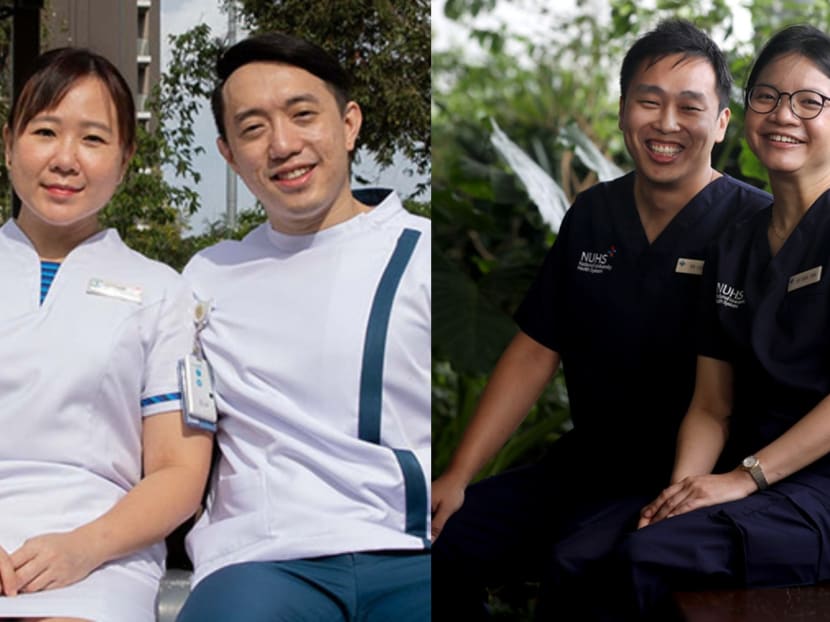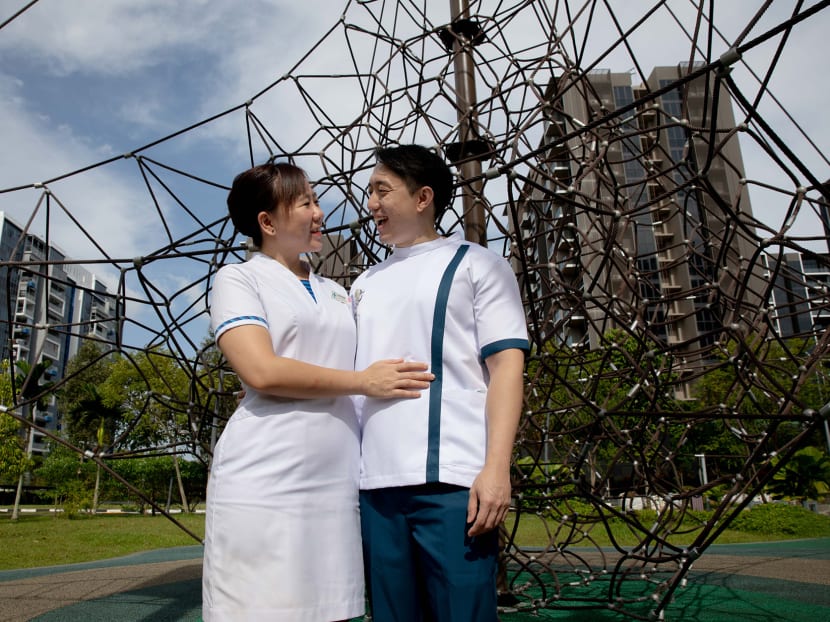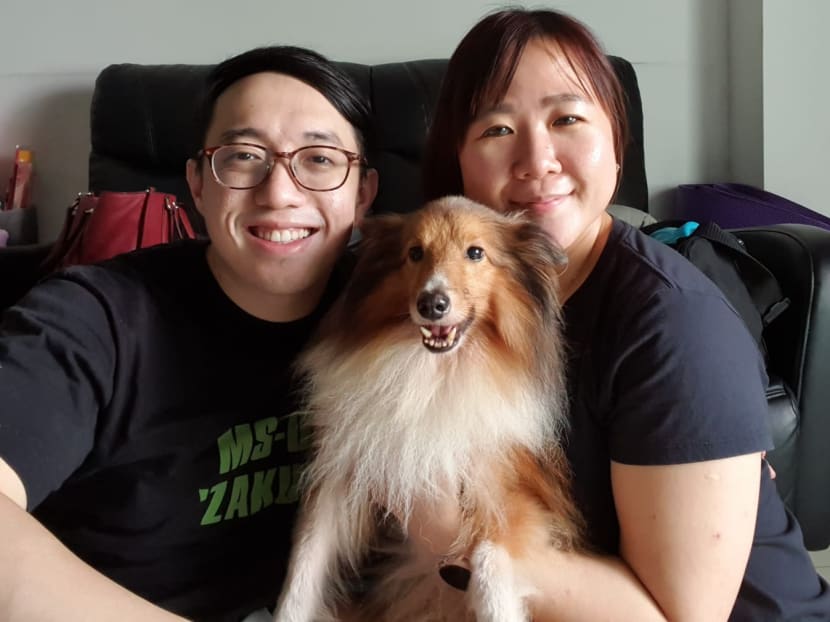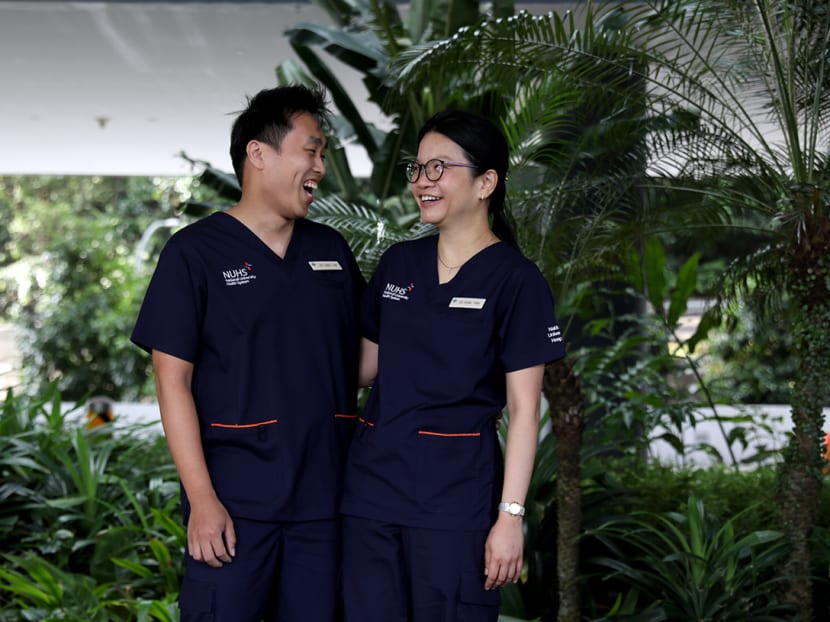Covid-19 stresses can be a relationship killer. Here’s what these doctors and nurses do to stay strong as a couple
SINGAPORE — Overwhelmed by the stress of juggling childcare, working from home, dwindling finances, job losses and disruptions to lifestyles, the strain of the Covid-19 pandemic has been the final nail in the coffin for some marriages.

Mr Joel Quek and wife Faith Hor (left), and Dr Lionel Lum and Dr Pearl Tong (right), talked about their experiences of working in healthcare and how they tackled the stresses that could spill into their relationship as a married couple.
- Married couples working in healthcare gave a glimpse into how they tackle relationship stresses during the pandemic
- One couple who work as nurses said they had the worst arguments in the six years they were married
- They had to learn to counter the negativity by focusing on what is good
- They resumed their hobbies in different ways and picked up new interests
- Another couple, doctors from National University Hospital, had to offer each other simple expressions of care and concern
SINGAPORE — Overwhelmed by the stress of juggling childcare, working from home, dwindling finances, job losses and disruptions to lifestyles, the strain of the Covid-19 pandemic has been the final nail in the coffin for some marriages.
The global health crisis may have driven some couples apart, but there are also others who have thrived and forged stronger bonds.
Healthcare workers, who have been in the frontline of the pandemic, have been feeling the weight on their shoulders and two married couples gave a glimpse of how they endured the stresses.
A common theme that runs through their accounts is that being kind and caring to each other especially when it is most difficult to do so helps to keep their relationship from fracturing. That and being alert to emerging problems and redoubling efforts to not let the cracks widen.
Their experiences have shown that it is the less tangible things that count, such as being quick to apologise instead of blaming the other party after an argument and treating each other with empathy and respect.
PANDEMIC STRESS LED TO HUGE ARGUMENTS
Nurses Joel Quek, 31, and Faith Hor, 34, are always dedicated and compassionate towards the patients under their care, but at home, it can be a different matter.
They admitted that they were not always the most patient with each other last year.
They even said that they had the worst arguments in the course of their six-year marriage, compounded by the circuit breaker or partial lockdown that restricted movement and activities here last April and May.
Both senior staff nurses, Mr Quek works in the high-level isolation unit at the National Centre for Infectious Diseases (NCID), while Madam Hor is with the surgical intensive care unit of Changi General Hospital (CGH).
Mr Quek’s work involves providing nursing care for patients suffering from diseases or novel pathogens that are highly virulent and cause severe illness.
Mdm Hor provides nursing care and care coordination for patients who require surgical treatment and she is also part of the first-responder team that is called when a patient’s condition deteriorates rapidly.
At the height of the public health crisis last year, she was deployed to support the team taking care of Covid-19 patients. She provided education and training sessions for personnel attending to patients who needed high dependency or intensive care.

As the couple work around three rotating shifts, maintaining a relationship during peace time was already a challenge. They spoke of some days when they did not see each other for more than 24 hours.
Mr Quek said: “The work was highly intense due to the evolving situation and we were exhausted after each work day. But all married couples will know that even at home, chores and tasks still need to be done. Our (pet) dog required care.”
They could no longer engage in their usual hobbies such as playing board games with friends and going to the gym. There was no outlet for their pent-up frustrations.
“We became sensitive to each other’s idiosyncrasies and it did not take much time for us to go into a full-blown argument,” Mr Quek said.
Their attempts to reduce arguments — by communicating less with each other — only led to misunderstandings and more arguments.
“We knew we still cared about each other very much. We just became so focused on the bad rather than the good in each other,” Madam Hor said.
FEELING ISOLATED
Then, the ever-looming risk of infection meant that they had to be constantly vigilant about infection control and the safety of the people around them.
They drastically reduced contact with their loved ones outside of the household.
“It was for the greater good but this added much inconvenience and at times, imposed a sense of loneliness on us,” Mr Quek said.
Due to their line of work and close contact with people infected with Covid-19, they were also not able to enter many public spaces during the early part of the pandemic, heightening their sense of isolation.
Sympathetic neighbours and friends buoyed their spirits by delivering food, herbal drinks and other supplies to them. “This gave us strength to continue our job,” Madam Hor said.
Mr Quek said: “The pandemic has caused a disruption to established routines for everyone. Such disruptions are already difficult to manage on a personal level, but when it happens to everyone, it can be a major nightmare. Not only do you have to adjust yourself, you also need to adapt to your partner.”
To counter the negativity, both of them had to find ways to continue with their hobbies, for instance, by working out at home. They picked up new interests such as playing video games and painting.
They also carved out time to play with their pet and there is the intention to start a family of their own soon.

To cherish one’s spouse, Mr Quek said, is to “delight in our partner though we may not necessarily agree with them all the time”.
Mdm Hor said that romantic gestures do have their place in a marriage, but they are not the glue that keeps love going.
“It is the small, everyday things that matter, such as helping each other with chores, communicating, encouraging and supporting each other. Trying to understand the underlying motivation behind (each other’s words and actions) and focusing on the good will go a long way in keeping a relationship healthy,” she added.
The couple met about a decade ago. At the time, Mdm Hor was pursuing a diploma in nursing, while Mr Quek was on a training assignment from the Singapore Armed Forces to teach nursing students to perform the role of a paramedic assistant for the Youth Olympic Games held in Singapore in 2010.
As far as beginnings go, they reminded couples to always think back on why they fell in love and decided to commit to each other and to “focus on that”.
Mr Quek also back up what his wife said: “In our day-to-day interactions now, we are actively reframing our mindset to focus on the good rather than the bad and to always look for the underlying intention of each other’s words and actions.
“It is a daily challenge and something that requires constant reminding.”
GRATITUDE AND THE SIMPLE THINGS
For doctors Lionel Lum, 39, and Pearl Tong, 40, the pandemic reinforced for them a basic truth: One can never express too much gratitude.
Thankfulness must take centrestage in uncertain times and that applies to their marriage, they said.

Married for 11 years, the couple who are employed at the National University Hospital (NUH) have two daughters aged 10 and eight.
“We learnt not to take each other for granted and to be grateful and thankful for the little things in life. It is a time to humble ourselves and to realise how much uncertainties there are despite advances in medical sciences,” Dr Lum said.
He is a consultant at NUH’s division of infectious diseases in the department of medicine.
His wife is a consultant at the division of gynaecologic oncology in the department of obstetrics and gynaecology.
BEING CONSIDERATE
Apart from being thankful for the small things, they had to learn to be patient with each other. They also try to “look out” for each other with simple expressions of care and concern.
For instance, as an infectious diseases doctor, Dr Lum’s working hours have been extended in the past year due to the pandemic. “Pearl would often plan for a nice meal to encourage me, despite having a busy day at work herself,” he said.
With the segregation of the clinical teams, the couple found that adapting and being flexible in spending time with each other and their children helped.
“Pearl had to step up to help with home affairs to keep our household running," Dr Lum said. "We continued doing things together, like taking walks to unwind for the day and going for regular grocery shopping, whenever there was a window of opportunity.”
During the early days of the pandemic when not much was known about the behaviour of the novel coronavirus, Dr Lum recalled that he was concerned about unknowingly taking the virus home.
“I adhered strictly to infection control measures like proper hand hygiene and using personal protective equipment, and also took quick showers before leaving the hospital as an added layer of protection,” he said.
“As we worked different hours with the team segregation, and because I would receive calls at night, I would sometimes sleep in the living room so that the calls would not disrupt Pearl’s sleep.”
LEARNING EACH OTHER’S ‘LOVE LANGUAGE’
The doctors try to have protected time together as a couple. It may involve arranging for a date night, scheduling to take leave at the same time where possible, or even doing something simple as taking an evening walk together.
“However, we realise that activities don’t necessarily draw us closer. Rather, communication and connecting with each other are more important,” Dr Lum said.
What is more important is understanding and accommodating each person’s specific “love language”, so that one may “speak” the language that the other person appreciates.
For example, Dr Lum said that his wife seldom desires gifts. “If I contributed acts of service, these would be perceived as a much better expression of love (to her).”
On the other hand, Dr Tong said that her husband is encouraged by words of affirmation, which is different from what she considers as an expression of love.
TEAMWORK AS PARENTS
The couple first met in their 20s during a medical mission trip to Cambodia organised by their church.
They had their first child around 2011 when they were both trainees in their specialities in NUH and went through their toughest test together as working professionals and parents.
Parenting does not get easier and in nurturing their children’s skills and talents, the two doctors said that frustration can easily set in if they try to “pigeonhole” the young ones or if they impose on the children what society deems as successful.
They are learning to let the children grow where their interests and strengths take them.
Their older child Sarah likes gymnastics, drama and acting, for example, while Ruth the younger one prefers taekwondo, craft and building things with her hands.
SLOW TO BLAME THE OTHER
When asked what they think is the secret to maintaining a relationship, Dr Tong said: “We don’t think there is a secret. Effort has to be made constantly to keep the flame burning, remembering the commitment that we have made to each other years ago.”
When disagreements happen, for example, they have learnt to be introspective — to be quick to correct themselves and slow to blame the other party.
“Simple apologies and honest words help resolve our conflicts,” Dr Tong added.






